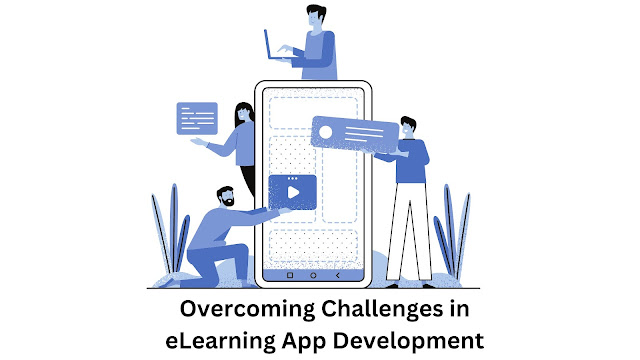Overcoming Challenges in eLearning App Development
The emergence of digital technology has revolutionized the methods through which we acquire knowledge and learn, prominently exemplified by the presence of eLearning apps, which now hold a crucial position in the contemporary educational domain. By providing adaptable, accessible, and personalized learning experiences, these applications have garnered immense popularity among both students and professionals. Nevertheless, the process of developing eLearning apps presents its own set of challenges, particularly for a eLearning app development company.
In this blog, we will explore the key obstacles faced by developers and discuss effective strategies to overcome them, ensuring the successful creation of robust and user-friendly eLearning applications.
Content Management and Delivery
One of the primary challenges in eLearning app development is the effective management and delivery of content. Ensuring that educational material is up-to-date, accurate, and well-structured is crucial for maintaining user engagement and knowledge retention. Developers must devise a content management system (CMS) that allows easy updates and enables seamless delivery across various devices and platforms. Implementing version control and automated content syncing mechanisms can streamline this process and help keep the app content relevant and current.
User Interface and Experience (UI/UX)
In the competitive eLearning market, user experience is paramount. Creating an intuitive and visually appealing user interface can significantly impact the success of an eLearning app. However, catering to diverse user preferences and device specifications can be challenging. Developers should conduct extensive user research, run usability tests, and incorporate feedback to fine-tune the UI/UX design. Emphasizing simplicity, clear navigation, and engaging interactions will enhance the app's usability and increase user satisfaction.
Gamification and Interactivity
Keeping learners motivated and engaged is vital for the success of any eLearning app. Gamification, which involves incorporating game-like elements such as points, badges, and leaderboards, can significantly boost user engagement. However, implementing gamification features without overwhelming the learners requires a delicate balance. Developers should carefully plan and integrate gamified elements that align with the app's educational objectives, making the learning process enjoyable and rewarding.
Compatibility and Responsiveness
In the fast-paced world of technology, users access eLearning apps from various devices, including smartphones, tablets, and computers. Ensuring compatibility and responsiveness across these different platforms is a major challenge. Adopting a mobile-first approach and utilizing responsive design principles can help create an app that adapts seamlessly to different screen sizes and orientations. Regular testing on multiple devices and operating systems is essential to identify and resolve compatibility issues.
Data Security and Privacy
eLearning apps deal with sensitive user data, including personal information and learning progress. Ensuring robust data security and privacy measures is critical to gain users' trust and comply with data protection regulations. Developers should implement strong encryption protocols, secure authentication methods, and regular security audits to safeguard user data from potential breaches and unauthorized access.
Scalability
As the user base grows, the eLearning app should be able to handle increasing traffic and data without compromising performance. Scalability is a significant challenge during app development. Adopting cloud-based infrastructure and optimizing the app's architecture can provide the flexibility to scale resources as needed. Load testing and performance profiling are essential to identify bottlenecks and optimize the app's performance for various user scenarios.
Offline Accessibility
Internet connectivity is not always available or reliable, especially in remote areas. Ensuring offline accessibility is crucial for eLearning apps to cater to users with limited or no internet access. Developers can implement progressive web app (PWA) features or enable offline content downloading for learners to access educational material even when offline. Offline access can significantly enhance the app's accessibility and extend its reach to users with connectivity challenges.
Continuous Improvement and Updates
The eLearning landscape is constantly evolving, with new technologies and teaching methodologies emerging regularly. To remain competitive and relevant, eLearning apps must adapt and improve continuously. Establishing a feedback loop with users, instructors, and stakeholders can provide valuable insights for updates and enhancements. Regular app updates should address user feedback, fix bugs, and introduce new features to keep the app fresh and engaging.
Conclusion
Conquering challenges in eLearning app development stands as a pivotal pursuit for any mobile application development company aspiring to lead in the educational technology realm. The triumphant realization of a sturdy and user-friendly eLearning app revolves around adeptly tackling several obstacles, encompassing content management, UI/UX design, gamification, compatibility, security, scalability, offline accessibility, and continuous updates.
The utmost priority for a mobile application development company lies in content management and delivery, guaranteeing the educational material remains current, precise, and well-organized. By integrating an efficient content management system and automated syncing mechanisms, the company can streamline the process of content updates and delivery, thereby ensuring a seamless learning experience for users.




Comments
Post a Comment